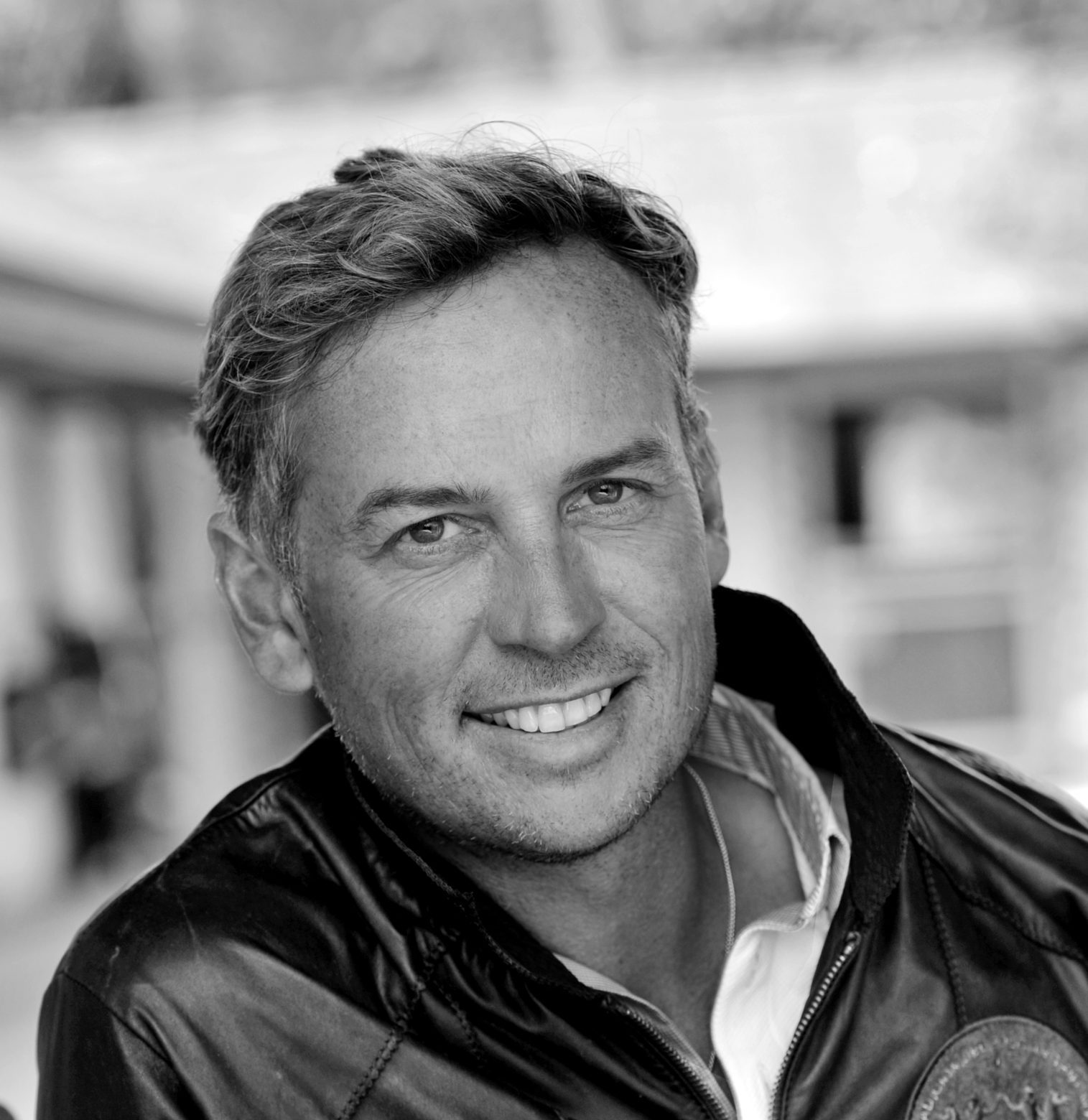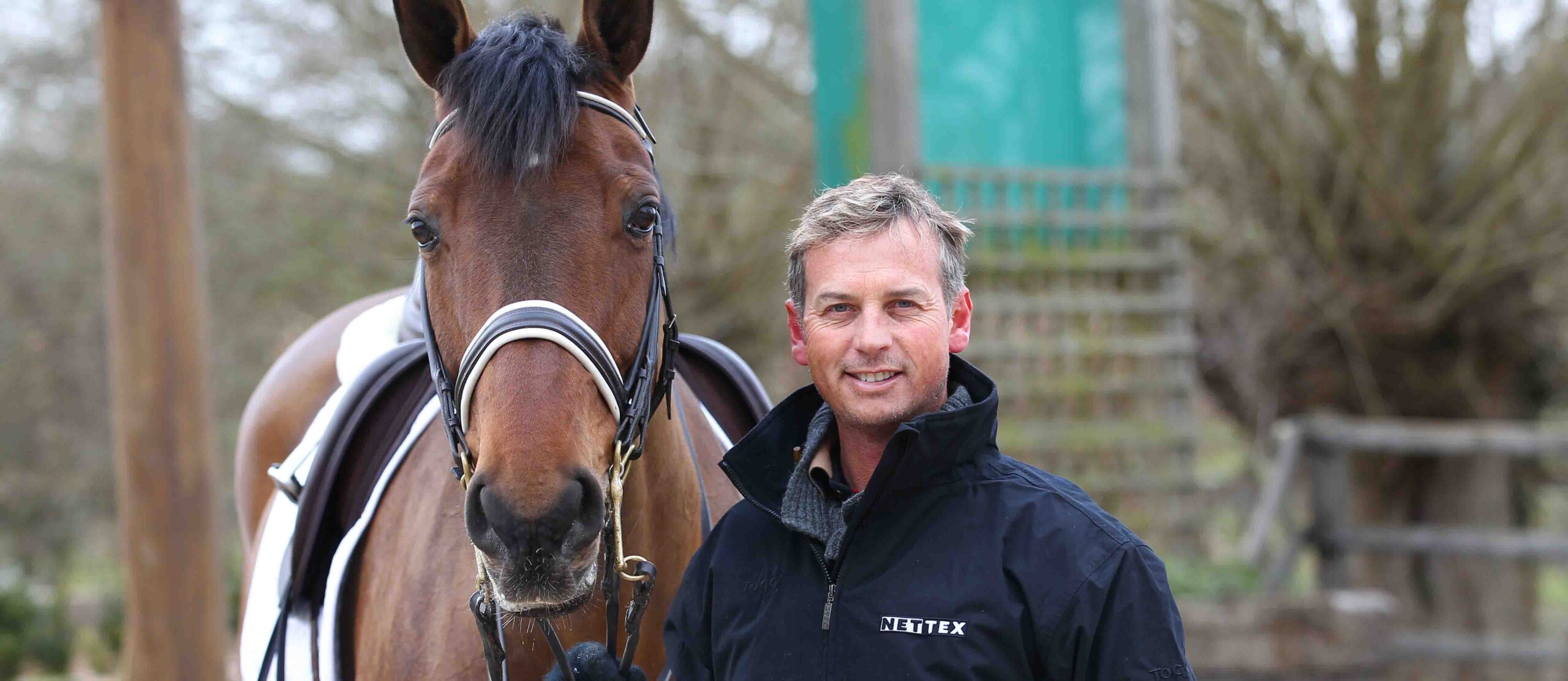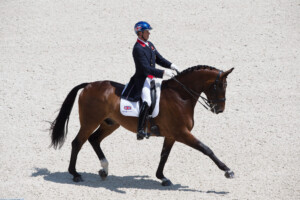Carl Hester. The very name has become synonymous with the best of British dressage, including, of course, Charlotte Dujardin, who rides for his stable. Hold on to your helmets, writes Candida Baker because the dressage maestro is coming to QSEC to give a masterclass at the Brisbane CDI in late July.
Sport is demanding, we all know that. A horse doesn’t get to the top by you feeding it apples and asking it would it mind doing a Grand Prix test or jumping a six-foot fence, says Carl Hester, who knows a thing or two about getting to the top. In this particular instance Hester was talking about his horse Escapado, also known as Peanuts, a talented Warmbloood who in a short space of time came last at Aachen, only to get the highest British Dressage Score at the 2004 Athens Olympics, followed by a fifth place in 2005 at the European Championships in Germany.
He was a nervous horse, Hester says, and I realised that for him being stabled was not the best thing. A lot of people criticized my management at the time but letting him live in a natural environment was the best thing for him when he was stabled he was so tense we couldn’t do a thing with him. Once we moved him outside he coped with pressure so much better.
Hester himself is only too familiar with the benefits of a natural environment. He was born in England, but was raised on the tiny Channel island of Sark, where there are no cars, and horses are still a way of life.
One of his earliest memories is of riding a somewhat stubborn donkey to the village shop, a slightly less than noble steed who was followed by a number of ponies and horses, many of whom were used a carriage horses during the day, and then ridden to Pony Club at the weekends. Like most kids, Carl drove tourist carriages in the school holidays, but he showed a competitive edge from an early age, winning the famous bareback race at a flat-out gallop and seriously out-manoeuvring his competitors.
If there is one thing that shows up in researching Carl, it’s precisely his competitive edge that sets him apart. This is not a rider, owner or coach who rests on his laurels. Even when a horse has done well, whether it’s him riding or one of his stables, there is a lot of post-performance analysis with a constant emphasis on understanding each individual horse.
When you train horses, you need to use methods that are not complicated to understand, he says. We have to get them, and keep them, in the right space so they are happy and that means developing trust and mutual respect.
The horse world, he has said: Needs positive images, positive people and positive training methods.
In part, his accentuate the positive philosophy came about because of his first job after he left Sark. At the age of 19, and with no winter employment prospects, he applied for a job at the Fortune Centre in Hampshire, where adults with learning and physical disabilities are given the chance to ride, and to have a sense of freedom and achievement that is often hard for them to experience.
The Centre also gave Carl the chance to compete, and it was on their skewbald mare, Jolly Dolly, that Carl competed in and won the 1985 Dressage Rider Championship. After the Centre Carl worked at
Jannie and Christopher Taylor’s farm in Gloucestershire where Jannie Taylor specialised in training difficult horses . I was happy with them, Carl says, but I did break an ankle and a shoulder during my brief eventing career. Mind you, he also competed at the first Blenheim Horse Trials and won the Spillers Dressage with Jumping Championship. His exposure to difficult horses built on the patience he’d learned at the Centre and he began to realise that the true basis of horsemanship, was, as he says: Finding a way based on tact, patience, firmness and kindness when dealing with horses with behavioural problems.
What has stayed with him has been a powerful force in his success. Horses need to think for themselves, rather than having their natural character and ability suppressed through harshness, he says. This has always stayed with me.
It didn’t long before destiny came knocking in the form of German-born dressage rider and businss man Dr Wilfried Bechtolsheimer. Dr Bechtolsheimer, (known as Dr B) and his wife Ursula run a breeding and training centre in Gloucestershire, and so it was inevitable that at some point Dr B’s attention would be drawn to Carl’s obvious talent, and that he would approach him to join his yard as a rider.
I was overawed at the interview, Carl has said. I’d never seen a yard like that or horses of that calibre. When Dr B asked him how much he would want the startled Carl told him nothing at all. In the end he got a cottage and a salary and thought all his birthdays had come at once.
Carl has come a long way since his cottage days. His spread in Gloucestershire is on 30 acres, with an historic home, 18 stables, an indoor and outdoor arena, and a menagerie of animals including peacocks, hens, guineafowl and dogs.
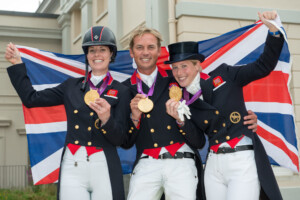
The older horses are stabled at night and turned out during the day, and the younger horses stay out at night and come in for their training sessions in the morning and are stabled during the day.
At the end of the day, these horses work very hard for us, travel the world, win medals for us, and it’s our job to give them as nice a life as possible, said Carl recently on a video of his property. He believes his eventing background means that he is less fussy about his horses than traditional dressage riders, and certainly he has the runs on the board to prove that his methods work.
Just a few of his achievements include being the youngest British rider ever to compete in an Olympic Games, when he competed on Georgioni at Barcelona in 1992 and his success with Team GB since has been stellar, taking gold in the 2012 Summer Games, and many other medal positions at the World and European Championships. In 2012 the FEI ranked him 12th in the world on Uthopia and in 2013 Carl was honoured with an MBE for services to equestrianism.
But back at the beginning of his illustrious career – after three years with Dr B, Carl went into a partnership with Kate Carter at her yard at Stow-on-the-Wold. When Kate decided to move to make more space for her stud, Carl made the decision to buy his own yard. Since then his horses have gone from strength to strength.
Uthopia, Valegro, Dances with Wolves these are names that make the hearts of dressage fans sing. It was, people have said, typical of Carl that as Charlotte Dujardin’s coach he could see Valegro’s special connection with Charlotte, and was able to watch his two superstars move into another strathosphere as they bonded so completely.
These days both Valegro and Uthopia make public appearances, in between stud duties, enjoying time in the fields and hacking out.
A perhaps unsung hero for many yards is the international travelling groom. In Carl’s case Alan Davies has travelled with the horses to Olympics, World and European Championships. In 2015 he was awarded Team GB Groom of the Year and in 2016 he won the Horse & Hound Groom of the Year award. He is also the first to ever receive the prestigious British Equestrian Federation Medal of Honour. It’s this attention to detail in all aspects of horse care that puts Carl’s yard a cut above, and Alan, Carl has said, is an essential part of that care.
One of the most exciting horses coming along is the 16-year-old Dances with Wolves, with whom Carl has clocked a massive amount of firsts at Grand Prix level. Dances With Wolves is really going to be my next one, Carl has said. He is a top horse but he is still very nervous and temperamental. I have to be very tactful with him and train him in the right way. Like Escapado. It’s a full time job having a horse like that.
After Rio, Carl was a little disappointed in his other 16-year-old’s performance, the massive 18hh Nip Tuck, even though Team GB received the Silver Medal and Carl was placed seventh in the individual dressage. One minute it’s a camera, one minute it’s a flower, he’s got a tiny mind, Carl said after the event with his customary humour. In the transition to walk he saw a tiny flower. I think he needs glasses.
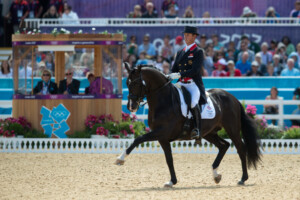
He firmly believes that Great Britain is the best country in the world for equestrian sports. It’s not just about producing winning horses, he says, it’s about discipline and breeding, longevity and the way we keep and care for our horses.
He is excited by the future and moving with the times in terms of the never-ending possibilities of improving the performance of horses with the best of the best. Biomechanics, saddle-fitters, nutritionists anything that makes our performance better, he says. His interest has included his input into the PDS Integro Mono Flap Saddle. I was involved with the flocking, the size of the flap, the knee-roll position all to make sure that the horses I ride who are all big movers can have maximum movement.
For Leesa Murray, Event Director of the Brisbane CDI & Carl Hester Masterclass, bringing Carl out for the Brisbane CDI is an important achievement. Of course he’s been to Australia before and given a Masterclass at Werribee and appeared at Equitana, but Melbourne is a long way from Queensland, she says. A few hundred of us went down to see him, and I have to say he was spellbinding. My husband was not a horse person, but he came down with me and he was spellbound too.
For Leesa the most important thing is to give as many people as possible the chance to see the maestro teaching. People still tell me how much it meant to them to see Charlotte Dujardin teach last year, and at first I was amazed but I’ve realised that it’s such a wonderful chance to watch teachers working with five or six horses, and that it gives us time to soak up the knowledge, she says.
As for Carl, according to Leesa, he is: Simply everything. His method and his message are always the same, whether it’s an established Grand Prix horse or a young horse. His message is consistent and that’s why everybody gets so much out of it. There’s not enough of him to go around for all of us to get a lesson, and so it’s my job to make sure that the price is reasonable enough for us to get a large audience, who can then go home and build on what they’ve seen.
For more information on Carl’s life, his autobiography, Making it Happen , co-authored with journalist Bernadette Hewitt is a fascinating look at the story behind the story of the most successful British dressage rider in history. To book tickets for the Carl Hester Masterclass go here: Carl Hester Masterclass
This story taken from HorseVibes Magazine, July 2018.
